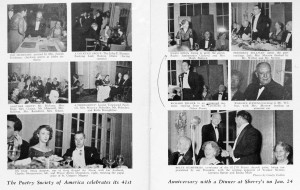[Posted by Michael Peluso, for Prof. David Rosen’s course, “Modern Poetry”]
 In the early 1960s, less than a decade after Wallace Stevens’s death at age 75, Trinity worked with his daughter Holly and the University of Connecticut archives to put together an exhibit on the poet. The exhibition focused partially on correspondences that Stevens kept up with friends and publishers, and also explored a significant portion of his personal collection of artwork that, presumably, influenced his own approach to poetry. Much has been made of the man’s fascination with burgeoning artistic movements, and the prints available help to flesh out a portrait of how Stevens explored the visual arts in service of his poetry.
In the early 1960s, less than a decade after Wallace Stevens’s death at age 75, Trinity worked with his daughter Holly and the University of Connecticut archives to put together an exhibit on the poet. The exhibition focused partially on correspondences that Stevens kept up with friends and publishers, and also explored a significant portion of his personal collection of artwork that, presumably, influenced his own approach to poetry. Much has been made of the man’s fascination with burgeoning artistic movements, and the prints available help to flesh out a portrait of how Stevens explored the visual arts in service of his poetry.
Buried within a pile of these prints and correspondences, though, a small pamphlet caught my eye. Provided, presumably, by Holly for the exhibition, this rather unassuming program for the Poetry Society of America’s 41st annual dinner suggests an interesting personal, and familial, side of Stevens that isn’t usually immediately evident in his work or in the common conception of the reticent insurance man who made pains to keep his poetic excursions separate from his Hartford business life. The artifact also tells us a bit about Stevens’s world in the poetry community, and about the evolving reception to his work.
The 41st annual dinner occurred in 1951, and it’s worth noting that Stevens, our guest of honor, as well as the Honorary President (Robert Frost), and the Honorary Vice-President (Leonora Speyer) were all elder statesmen of American poetry by that time. It’s also worth noting that, among so many of their contemporaries who travelled overseas extensively and blurred the lines of professed nationalism, Speyer, and particularly Frost and Stevens, were all primarily American poets, making them prime candidates, naturally, for this poetry society’s recognition. The gathering was a celebration of the old guard, full of long-overdue odes to Stevens’s Harmonium from those early adopters who saw its worth well before the critics. Said A.M. Sullivan, it “made me aware for the first time of a person’s ability to enjoy poetry without the necessity of explanation or justification.” The celebration of poets passed, and the honoring of those formative to the “American” movement speaks to an appropriate concern with the foundations of American poetry. Additionally, the dinner was an occasion to meditate on the nature and presence of American poetry on a global stage, and a celebration of its current representatives. Similarly, a glance through guest list suggests that the society was, possibly, more concerned with the social visibility of poetry and poetic support than with the virtues of poetics themselves.
With this in mind, Holly’s brief notations on the page showing her father are open to a range of interpretations. Under one picture, captioned “Richard Wilbur, in an entranced moment…” Holly underlined “entranced,” which undercuts the gravitas of the situation, and suggests, somewhat sarcastically, that the pomp and circumstance and florid language of the event was somewhat less than genuine, or, at the very least, trumped up to excessive proportions in either the intended perception or in the retelling. In the next pane over, Stevens himself takes center stage, “lending an attentive ear” to the proceedings. In the margin, with an arrow pointing to her father, a daughter’s “ha” complicates the scene immeasurably. It could be a simple piece of familial teasing, a goofy picture warranting a small jibe, or an inside joke between parent and progeny. Given what we know of Stevens, with his reluctance to discuss his poetry, mixed with the smattering of dignitaries, ambassadors, and actual poets in attendance, the notation, and Stevens’s expression, could be read as a signal of discomfort among the bombast of the occasion. The underlined “entranced” would certainly suggest that Holly was of the opinion that this group took themselves a bit too seriously (whether the group themselves shared this opinion remains less clear, although the text alone would suggest a certain formality), and paired with the somewhat inscrutable expression on Stevens himself, these two simple notations open a world of possibility about the truth of an experience otherwise unapproachable through the text itself. At the very least, these marks serve to humanize and humble. We tend to lionize our heroes, and even our attentions to their personal lives come through a reserved distance. Holly’s marks, however slight, give an intimately unguarded lens, and partial clue, into her father’s appreciation of his poetic society.